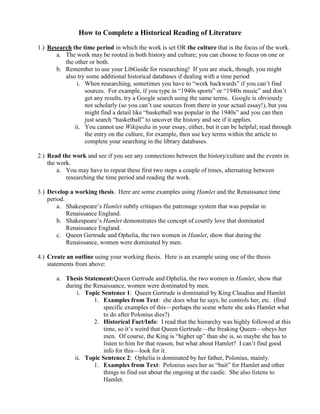
How to Analyze Literature Historically
- 1. How to Complete a Historical Reading of Literature 1.) Research the time period in which the work is set OR the culture that is the focus of the work. a. The work may be rooted in both history and culture; you can choose to focus on one or the other or both. b. Remember to use your LibGuide for researching! If you are stuck, though, you might also try some additional historical databases if dealing with a time period i. When researching, sometimes you have to “work backwards” if you can’t find sources. For example, if you type in “1940s sports” or “1940s music” and don’t get any results, try a Google search using the same terms. Google is obviously not scholarly (so you can’t use sources from there in your actual essay!), but you might find a detail like “basketball was popular in the 1940s” and you can then just search “basketball” to uncover the history and see if it applies. ii. You cannot use Wikipedia in your essay, either, but it can be helpful; read through the entry on the culture, for example, then use key terms within the article to complete your searching in the library databases. 2.) Read the work and see if you see any connections between the history/culture and the events in the work. a. You may have to repeat these first two steps a couple of times, alternating between researching the time period and reading the work. 3.) Develop a working thesis. Here are some examples using Hamlet and the Renaissance time period. a. Shakespeare’s Hamlet subtly critiques the patronage system that was popular in Renaissance England. b. Shakespeare’s Hamlet demonstrates the concept of courtly love that dominated Renaissance England. c. Queen Gertrude and Ophelia, the two women in Hamlet, show that during the Renaissance, women were dominated by men. 4.) Create an outline using your working thesis. Here is an example using one of the thesis statements from above: a. Thesis Statement:Queen Gertrude and Ophelia, the two women in Hamlet, show that during the Renaissance, women were dominated by men. i. Topic Sentence 1: Queen Gertrude is dominated by King Claudius and Hamlet 1. Examples from Text: she does what he says, he controls her, etc. (find specific examples of this—perhaps the scene where she asks Hamlet what to do after Polonius dies?) 2. Historical Fact/Info: I read that the hierarchy was highly followed at this time, so it’s weird that Queen Gertrude—the freaking Queen—obeys her men. Of course, the King is “higher up” than she is, so maybe she has to listen to him for that reason, but what about Hamlet? I can’t find good info for this—look for it. ii. Topic Sentence 2: Ophelia is dominated by her father, Polonius, mainly. 1. Examples from Text: Polonius uses her as “bait” for Hamlet and other things to find out about the ongoing at the castle. She also listens to Hamlet.
- 2. 2. Historical Fact/Info: One source discussed the importance of the family hierarchy, so does Ophelia listen to Polonius simply because he’s her father? What about Hamlet? Man, does he just have all the power? 5.) Using your outline, return to your research (and the work itself). Notice that in these outlines, lots of questions are raised; the research will help tie everything together. a. Remember that your sources can be just on the work or just on the history/culture, or a combination of both. When searching, try searching both the work as well as the time period. It is your job to make the connections (between the history and the work) for your reader! 6.) Remember to be specific—use very specific examples from the work, and use quotes as well as summaries from your additional sources.